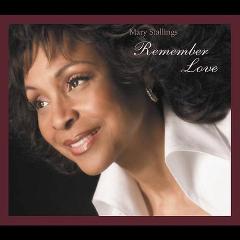Mary Stallings - Remember Love (2005)
Mary Stallings - Remember Love (2005)

01. What a Difference a Day Makes 1:30 02. There Is No Greater Love 4:17 03. Hello Yesterday 6:23 04. Centerpiece 6:23 05. Moment to Moment 4:18 06. Dindi 5:35 07. Remember Love 3:55 08. Lucky to Be Me 4:32 09. I Just Found Out About Love 3:21 10. Make Me Rainbows 3:12 11. Why Should There Be Stars 7:16 12. Still the One 3:30 13. Stuck in a Dream 5:56 14. Funny Not Much 2:53 15. What a Difference a Day Makes 2:04 Musicians: Mary Stallings - vocals Geri Allen - piano, organ Darryl Hall - double bass Billy Hart - drums Frank Wess - flute, tenor sax Vincent Herring - alto sax Wallace Roney – trumpet
Starting with Concord Jazz in the '90s and continuing with MaxJazz and now Half Note Records, Mary Stallings's talents have finally been revealed.
On Remember Love, she is abetted by a stellar band, including pianist Geri Allen (who also provides arrangements and serves as producer), drummer Billy Hart, Frank Wess on tenor and flute, trumpeter Wallace Roney, and alto saxophonist Vincent Herring. Stallings sings well and stays focused, avoiding a distracting habit of singing the wrong words. She seems to relish the lyrics of Henry Mancini's "Moment to Moment as well as Allen's Latin-inflected setting. The gorgeous "Dindi, however, never finds its focus.
Like the great Etta Jones, Stallings is at her best as a flat-footed (Jones' apt term for her own sorely missed art), straight-shooting raconteur of love lost and found. As if to prove this point, with just Darryl Hall's bass, she smokes "Centerpiece, and she outswings the curiously restrained band on "I Just Found Out About Love.
The band seems reluctant to let loose, creating an atmosphere far too somber at times. The rough-and-tumble accompaniment of Gene Harris and Monty Alexander on previous sessions is missing here. And, because of this restraint, there is too much of one mood. Songs like Shania Twain's "Still the One and "Stuck in a Dream, although nicely sung, fail to take off.
One of the session's finest moments comes, however, when Stallings stands "Funny Not Much on its head, eschewing the usual slow tempo for a bracing stroll. Likewise, she negotiates the rhythmic shifts of "There Is No Greater Love skillfully. Allen's organ solo is thoughtful and restrained.
"Hello Yesterday and "Why Should There Be Stars showcase her art so well as she lingers over blue-hued melodies, singing of lost loves. This type of singing, almost a forgotten art today, is not merely a lesson in nostalgia, but a reminder of the continuing importance of tradition in jazz. Here the arrangements lovingly frame the singer, and Wess and Roney carefully caress her declarations.
Stallings takes the long-honored blues-ballad approach, shows she is not afraid to swing hard, and revitalizes a venerable tradition in jazz singing. ---Andrew Rowan, allaboutjazz.com
Last Updated (Saturday, 31 January 2015 10:23)








